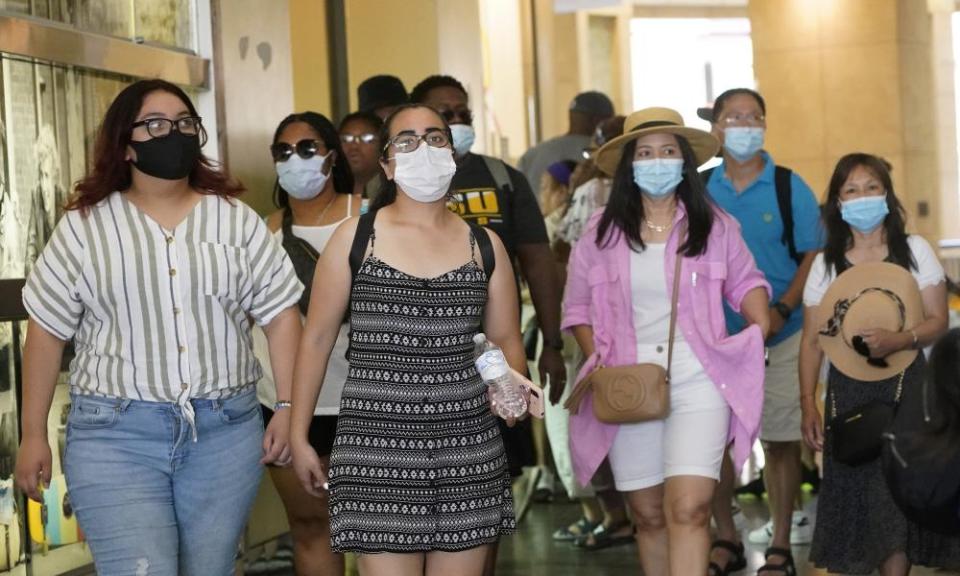Millennials hit with biggest increase in California Covid cases

Millennials are accounting for the biggest rise in Covid-19 cases in California, an analysis of state and federal data shows, as the Delta variant drives growing infection rates and health officials scramble to encourage the generation to get vaccinated.
Covid-19 cases in California have shot up for all age groups in the past two months, but millennials – defined here as those between the ages of 18 and 34 – have seen their case numbers climb faster than other age brackets.
Infections among millennials have jumped 554% above what the age group saw in a comparable two-week period in early June, according to an analysis of data compiled by the epidemiologist George Lemp. Those 35 to 49 saw the next highest climb, with cases growing by 479%, while those 65 to 79 saw a 222% increase in the same time period.
A similar trend is playing out nationwide, federal data shows. Data from the Centers for Disease Control and Prevention (CDC) from 31 July indicates that across the country, the highest infection rates have been recorded among people aged 18 to 30. That group is experiencing 111 cases per week per 100,000 people, compared with 103 cases for people in their 30s and far fewer for other age brackets. (Neither state nor federal data allows researchers to hone in on the exact ages currently considered to define the millennial generation, which differ from source to source.)
The findings come at a time when hospitals across the US are reporting that younger patients make up a growing portion of hospitalizations and some doctors say they are seeing sicker young patients.
There is no conclusive research yet on whether the new Delta variant is affecting younger patients differently than previous coronavirus variants. Experts suspect lower vaccination rates among young people, combined with more social contacts, are at least partially to blame for the high rate of infections.
“There’s a proportion of [young people] who feel the death rate isn’t very high for them and are saying the virus isn’t that big of a deal,” said Lemp, who recently retired from his role as director of California’s HIV/Aids Research Program at the University of California, Berkeley.
Related: ‘No one’s invincible’: fresh mask mandates and rising Delta cases hit California
“The other thing about young people is they are more likely to be out and about mingling with others,” he said, which appeared to be making them “the leading edge of the spread”.
“Young adults have the highest infections and lowest vaccination rates,’’ said Sally Adams, a nurse and medical researcher at the University of California, San Francisco, and the lead author of a recent study of the reluctance of young people to get vaccinated.
In California, younger age groups are lagging in getting their vaccinations, according to state data. Only 67% of those ages 18 to 49 have received at least one dose of the vaccine, compared with 91% of those over 65, according to the Los Angeles Times’ Covid tracker.
The CDC has said the Delta variant is far more transmissible than other viruses in the coronavirus family, and that data from an outbreak in Massachusetts suggests the variant is showing some ability to spread even among vaccinated people. But the vaccines have proven to be incredibly effective at preventing serious illness, and doctors warn that the majority of people now ending up hospitalized have not been vaccinated.
Experts and policy makers from Washington DC to Los Angeles county are getting on TikTok and YouTube to plead with young people to get vaccinated.
Recently, Joe Biden hosted the pop star Olivia Rodrigo at the White House to promote the vaccine. Anthony Fauci, the nation’s top infectious disease expert, has been making appearances on TikTok with social media influencers like the former “Dance Moms” star Nia Sioux to say: “Tell all of your TikTok buddies to get vaccinated!”
Adams, the UCSF researcher, said the aim of the outreach was not to “make young adults out to be the bad guys”. But experts were seeking ways to convince them through their peers to get vaccinated, she said, “instead of having a bunch of old people telling them to eat their vegetables”.
Younger adults utilize healthcare resources much less than older people so they may not be getting the message from their doctors, she added. “They get more information from social media,” she said.
In California, Los Angeles county is making its own public service announcements targeting youth. Students in California’s Central Valley have started organizing campaigns encouraging their friends to get the shot.
Valentino Silva, a 21-year-old law student in Stockton, California, said he had spoken with many young adults in his area who are deterred by conspiracy theories they see on social media and or who simply feel invincible against the virus. He has been campaigning on social media in hopes of waking his generation up to what is happening.
“I see a lack of urgency in youth,” he said. “We’re kind of straggling along here; we’re not in a hurry.”

 Yahoo Finance
Yahoo Finance 